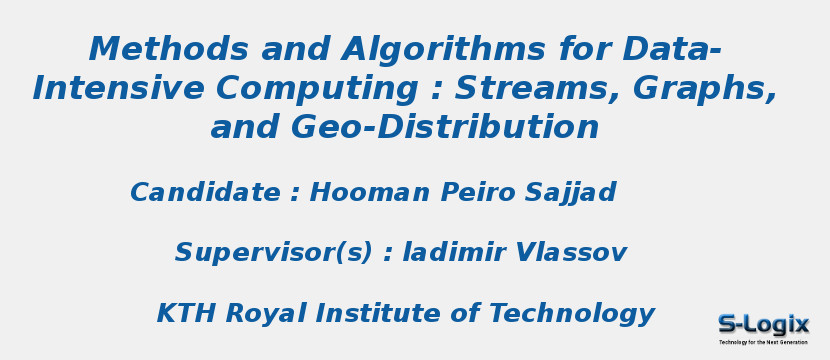Research Area: Edge Computing
Struggling with the volume and velocity of Big Data has attracted lots of interest towards stream processing paradigm, a paradigm in the area of data-intensive computing that provides methods and solutions to process data in motion. Today’s Big Data includes Geo-distributed data sources. In addition, a major part of today’s Big Data requires exploring complex and evolving relationships among data, which complicates any reasoning on the data. This thesis aims at challenges raised by Geo-distributed streaming data, and the data with complex and evolving relationships.
With respect to data with complex and evolving relationships, this thesis aims at effective and efficient processing of inter-connected data. There exist several domains such as social network analysis, machine learning, and web search in which data streams are modeled as linked entities of nodes and edges, namely a graph. Because of the inter-connection among the entities in graph data, processing of graph data is challenging. The inter-connection among the graph entities makes it difficult to distribute the graph among multiple machines to process the graph at scale. Furthermore, in a streaming setting, the graph structure and the graph elements can continuously change as the graph elements are streamed. Such a dynamic graph requires incremental computing methods that can avoid redundant computations on the whole graph.This thesis proposes incremental computing methods of streaming graph processing that can boost the processing time while still obtaining high quality results.
In this thesis, we introduce HoVerCut, an efficient framework for boosting streaming graph partitioning algorithms. HoVerCut is Horizontally and Vertically scalable. Our evaluations show that HoVerCut speeds up the partitioning process significantly without degrading the quality of partitioning. Finally, we study unsupervised representation learning in dynamic graphs. Graph representation learning seeks to learn low dimensional vector representations for the graph elements, i.e. edges and vertices, and the whole graph. We propose novel and computationally efficient incremental algorithms. The computation complexity of our algorithms depends on the extent and rate of changes in a graph and on the graph density. The evaluation results show that our proposed algorithms can achieve competitive results to the state-of-the-art static methods while being computationally efficient.
Name of the Researcher: Hooman Peiro Sajjad
Name of the Supervisor(s): ladimir Vlassov
Year of Completion: 2019
University: KTH Royal Institute of Technology
Thesis Link: Home Page Url
